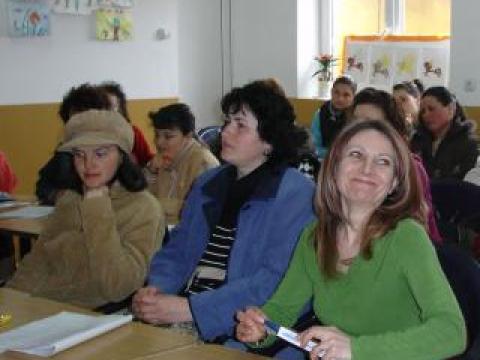Romanian villagers’ business potential boosted by tourism training

“The tourism course offers Corbu and Vadu community members the opportunity to have a stable source of income through work in guesthouses. Of course, tourists will benefit from the quality services of the guesthouses, so this is a ‘win win’ for everybody involved,” said Loredana Giuglea, World Vision zonal manager.
This professional training course is a wonderful opportunity for Corbu and Vadu community members to change their lives for the better.
“This professional training course is a wonderful opportunity for Corbu and Vadu community members to change their lives for the better,” said Maria Frangeti, director of economics of the Training Center for Personnel Working in Handicraft Cooperative Societies (CEPECOM). World Vision organised the course in partnership with CEPECOM.
“Because this course aims at growing tourism in this area, the students engage in marketing research for Corbu community. They are identifying specific foods, places and attractions that would appeal to tourists. Students must also develop a business plan for their guesthouses,” she said.
Constanta County lies on the western coast of the Black Sea and attracts tourists seeking peace and quiet. Some 16 seaside resorts have been established on Constanta’s 100 km of beach.
Corbu village is situated only 8 km from Mamaia, the largest Romanian resort on the Black Sea. Paradoxically, Corbu’s landscapes and beaches are nearly untouched, making it an attractive investment for foreign investors and local authorities. In fact, the entrance to Corbu village was recently built with Romanian and British funding.
Corbu boasts clean seawater that is ideal for students of nearby scuba diving schools. The beaches are also idyllic for kite surfing, and there is an accredited windsurfing school.
“Because Corbu village borders the Black Sea, the tourism potential is very good. Families from Corbu and Vadu are determined to develop tourism services by accessing local credits, but their households lack the necessary standards for tourist accommodations. Also, they don’t have the qualifications as stated by the European Union to work in a guesthouse," said Corina Iordanescu, World Vision community development project coordinator.
World Vision’s initiative is more than welcome for our community because our village is eager to develop tourism.
“World Vision’s initiative is more than welcome for our community because our village is eager to develop tourism. As Mayor, I want to build my knowledge of rural tourism as well since our village will soon have modern seaside resorts,” said Marian Galbinasu, Mayor of Corbu.
“I am a bookkeeper, but I have worked in a rural guesthouse and want to open my own guesthouse in the future. I need to learn more about rural tourism and obtain a diploma, so I am attending this training organised by World Vision,” said Mireal Curteanu, a woman from Corbu village.
The tourism course, accredited by the Ministry of Labor, Family and Equal Opportunities – Government of Romania, provides both theoretical and practical training and incorporates a tourism module, culinary art module, communication module, and modules on farming and agricultural culture. The cost of the course, US $110 per student, is shared by World Vision and participating students.
This professional training course is a wonderful opportunity for Corbu and Vadu community members to change their lives for the better.
“This professional training course is a wonderful opportunity for Corbu and Vadu community members to change their lives for the better,” said Maria Frangeti, director of economics of the Training Center for Personnel Working in Handicraft Cooperative Societies (CEPECOM). World Vision organised the course in partnership with CEPECOM.
“Because this course aims at growing tourism in this area, the students engage in marketing research for Corbu community. They are identifying specific foods, places and attractions that would appeal to tourists. Students must also develop a business plan for their guesthouses,” she said.
Constanta County lies on the western coast of the Black Sea and attracts tourists seeking peace and quiet. Some 16 seaside resorts have been established on Constanta’s 100 km of beach.
Corbu village is situated only 8 km from Mamaia, the largest Romanian resort on the Black Sea. Paradoxically, Corbu’s landscapes and beaches are nearly untouched, making it an attractive investment for foreign investors and local authorities. In fact, the entrance to Corbu village was recently built with Romanian and British funding.
Corbu boasts clean seawater that is ideal for students of nearby scuba diving schools. The beaches are also idyllic for kite surfing, and there is an accredited windsurfing school.
“Because Corbu village borders the Black Sea, the tourism potential is very good. Families from Corbu and Vadu are determined to develop tourism services by accessing local credits, but their households lack the necessary standards for tourist accommodations. Also, they don’t have the qualifications as stated by the European Union to work in a guesthouse," said Corina Iordanescu, World Vision community development project coordinator.
World Vision’s initiative is more than welcome for our community because our village is eager to develop tourism.
“World Vision’s initiative is more than welcome for our community because our village is eager to develop tourism. As Mayor, I want to build my knowledge of rural tourism as well since our village will soon have modern seaside resorts,” said Marian Galbinasu, Mayor of Corbu.
“I am a bookkeeper, but I have worked in a rural guesthouse and want to open my own guesthouse in the future. I need to learn more about rural tourism and obtain a diploma, so I am attending this training organised by World Vision,” said Mireal Curteanu, a woman from Corbu village.
The tourism course, accredited by the Ministry of Labor, Family and Equal Opportunities – Government of Romania, provides both theoretical and practical training and incorporates a tourism module, culinary art module, communication module, and modules on farming and agricultural culture. The cost of the course, US $110 per student, is shared by World Vision and participating students.
Share